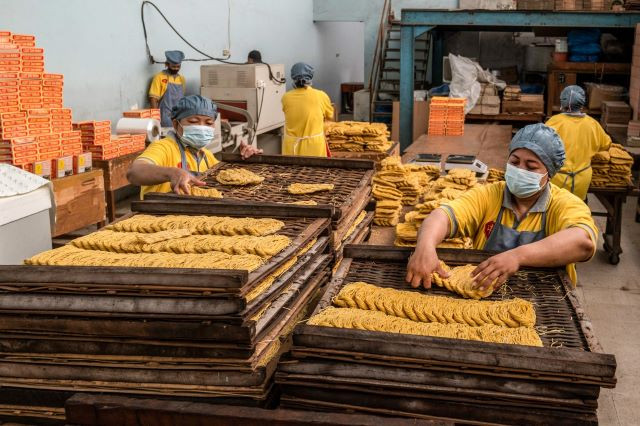Popular Reads
Top Results
Can't find what you're looking for?
View all search resultsPopular Reads
Top Results
Can't find what you're looking for?
View all search resultsSekar Wulan Sari: Fighting addiction
JP/Mike JohannsonWhen an opportunity presents itself to make a pivotal change in your life, you don't always get a second chance
Change text size
Gift Premium Articles
to Anyone

JP/Mike Johannson
When an opportunity presents itself to make a pivotal change in your life, you don't always get a second chance. You have to grab on to it with both hands and not let go in order to make it work. Sekar Wulan Sari did just that.
Wulan experienced this eye-opening moment in 2001, during the month of Ramadan, while she sat at her bus stop in the early hours of the morning, waiting for a drug-dealer to come by. Two men - one looked deranged and the other homeless - stood next to her. She had been using heroin for years and had been kicked out of her parents' house in 1996 because of it. She had even been forced to live on the streets at times.
But life wasn't always this gloomy. Before heroin entered her life in 1996, Wulan had been a diligent student at school and a well-behaved daughter to her parents.
At the time of her downfall, she was studying public relations at university.
She tried to quit using heroin several times without success in the years to come and never quite realized how far from grace she had fallen.
She thought she still looked like a fully functional, perfectly normal member of society and had never considered how other people perceived her.
As she was sitting at the bus stop, a few pedestrians came by to hand out sedekah, an offering made according to Muslim tradition to those in need, which may come in the shape of some small money or some food.
The well-meaning people first gave food to the homeless man, then to the man Wulan had deemed insane and, finally, to her.
At that very moment, Wulan realized how the outside world perceived her. She thought to herself: "This is not me. This is not Wulan. I have dreams." A moment later, she decided she would quit using heroin, she would change, and this time she was determined to succeed.
Almost 10 years down the road, Wulan, program director for the Stigma Foundation, is a very diffe-rent person than she was in 2001. The strength of her determination proved itself true.
From the day she made the decision to change, she embarked not only on a journey of self-improvement but also launched herself wholeheartedly into helping others still living the life she left behind that day.
"I am still an addict and always will be, but I choose to not be *an active* one," said Wulan, as she emphasized the importance of quitting on your own.
Wulan is a strong advocate for change when it comes to Indonesia's current drug-laws. Drug users shouldn't simply be punished, she said, as they are under Indonesia's current drug policy.
She has traveled around the world to speak about drug-related issues, including in Canada, Mexico, Poland and Sri Lanka, has been involved in dozens of seminars, training programs and conferences throughout Indonesia and overseas, and has even attended a UN General Assembly meeting in New York representing Indonesian drug users.
In 2004, with the help of AusAid, Wulan founded the Stigma Foundation, a community-based organization that provides a network of support for drug users and people who want to quit drugs. Most of its members are former or active drug users, people undergoing methadone treatment, psychiatrists, college students, doctors, parents and others concerned about HIV/AIDS.
The name Stigma was chosen because that is exactly how drug users are perceived in Indonesian society, Wulan said.
"There is no difference between a drug dealer and a drug user in Indonesian narcotics law, they are both seen as committing the same crime," she said.
According to Wulan, Indonesia's narcotic laws are only part of the problem. One of the bigger issue remains that society as a whole tends to view drug-users as useless and amoral criminals. She wishes this attitude would change.
"I want people to know that former drug users can contribute positively to society."
There are three dimensions to the problem, she went one, the content of the law, the structure of the law and culture. By this, Wulan means that not only the content of the law but also the people involved in legislation and the culture surrounding it all need to change.
Harm reduction rather than punishment is something Wulan firmly believes in. Harm reduction means helping instead of punishing, teaching drug users how to reduce the harm they are doing to themselves until they are ready to quit.
This entails providing them with clean needles whenever possible and informing them about the very real threat of HIV/AIDS when sharing needles - something drug users are prone to do in order to save money.
"Harm reduction saves lives. Giving needles saves lives," she said.
People will not instantly quit just because they should, said Wulan, adding that drug users should be given clean needles while they are still using drugs. Not only for their own sake, but for the sake of society as a whole to fight against the spread of HIV/AIDS, a problem much more serious than the Indonesian government would admit to.
"You have to understand addiction first. It is not easy to quit," said Wulan, when asked why drug users didn't just quit, rather than be provided with clean needles, if harm reduction was truly the goal.
"Indonesians do not think that HIV/AIDS is a serious issue in this country. It is."









